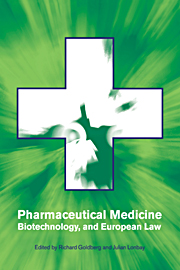Book contents
- Frontmatter
- Contents
- Notes on the contributors
- Preface
- Foreword by Francis G. Jacobs
- Editors' note
- Table of cases
- Table of treaties, European legislative instruments and national legislation
- Introduction
- Part I Free movement of goods and persons, competition and intellectual property
- Part II European drug regulation
- Part III Biotechnology
- 7 The morality clauses of the Directive on the Legal Protection of Biotechnological Inventions: conflict, compromise and the patent community
- Part IV Product liability and transnational health care litigation
- Index
7 - The morality clauses of the Directive on the Legal Protection of Biotechnological Inventions: conflict, compromise and the patent community
from Part III - Biotechnology
Published online by Cambridge University Press: 24 October 2009
- Frontmatter
- Contents
- Notes on the contributors
- Preface
- Foreword by Francis G. Jacobs
- Editors' note
- Table of cases
- Table of treaties, European legislative instruments and national legislation
- Introduction
- Part I Free movement of goods and persons, competition and intellectual property
- Part II European drug regulation
- Part III Biotechnology
- 7 The morality clauses of the Directive on the Legal Protection of Biotechnological Inventions: conflict, compromise and the patent community
- Part IV Product liability and transnational health care litigation
- Index
Summary
Introduction
After a decade of intensive lobbying, legislation and litigation, the regulatory framework in Europe for the legal protection of biotechnological inventions is now taking shape. The fundamental issue within this framework is whether, in principle, the products and processes associated with modern biotechnology (in humans, animals and plants) are to be treated as patentable.
In the European Union (where the chequered history of the recently agreed Directive on the Legal Protection of Biotechnological Inventions stretches back to 1988), as at the European Patent Office (operating under the European Patent Convention), the concept of patentability has been the focal point for debates reflecting, on the one side, the interests of the biotechnology industry (aided by the generally scientific and technical approach of the patent community) and, on the other side, the interests of various constituencies concerned about such matters as human dignity and the commercialisation of life, animal welfare and environmental harm.
The emerging regulatory framework responds to these competing interests in two ways. First, in general, biotechnology is to be treated no differently from any other inventive science that comes forward with patent claims. Thus, provided that the particular claim relates to an invention (with a declared industrial application) rather than to a mere discovery, genetically engineered products – even those incorporating human gene sequences – will satisfy the technical criteria of patentability. Similarly, there are to be no new general tests of exclusion for biotechnological inventions: the standard exclusions from patentability, concerning in particular morality, public policy, essentially biological processes for the production of plants or animals, and plant and animal varieties, will apply.
- Type
- Chapter
- Information
- Pharmaceutical Medicine, Biotechnology and European Law , pp. 157 - 182Publisher: Cambridge University PressPrint publication year: 2001
- 2
- Cited by

